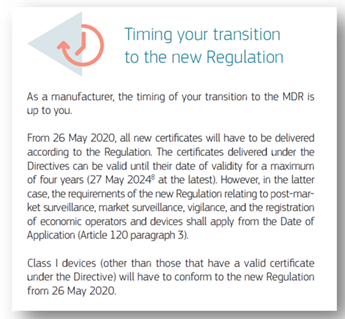Although the “new approach” to regulating medical devices has always given more urgency to higher-risk medical devices, this is not the case for the European Medical Device Regulation (MDR). Class 1 medical devices must fully comply with the regulation by May 26, 2020, or be shut out of the region.
|
ADVERTISEMENT |
This could be more problematic for dental products, which are inherently lower risk. Rubber dams and dental operating lights will have to comply before MRIs and pacemakers.
 To ensure that medical device manufacturers of class 1 devices understand that they must comply immediately on May 27, 2020, when the new regulation goes into effect, the European Commission states this plainly in its “Fact Sheet to Medical Device Manufacturers.”
To ensure that medical device manufacturers of class 1 devices understand that they must comply immediately on May 27, 2020, when the new regulation goes into effect, the European Commission states this plainly in its “Fact Sheet to Medical Device Manufacturers.”
…

Add new comment